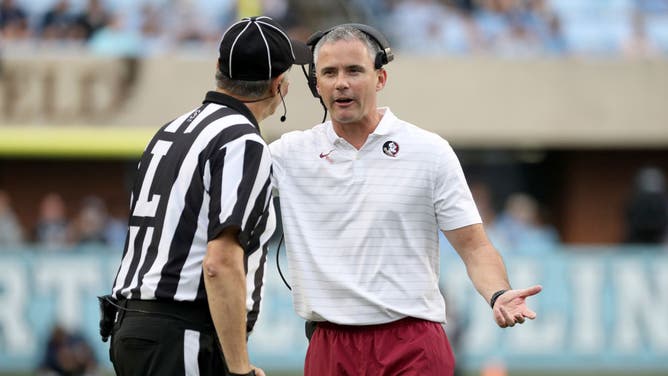Can Florida State, Clemson, Others Force Uneven Revenue Share In ACC?
Florida State is ready for the Atlantic Coast Conference to fork over additional revenue, at the expense of other member schools. Along with the Seminoles, a number of ACC schools are looking for more money in the current television deal, even if it means an uneven revenue split.
The biggest question is what can the conference actually do when it comes to further incentives for schools like Florida State, Clemson and Virginia Tech. There is certainly a problem in the ACC, with some schools feeling as if they pull more weight than others. This point is actually valid, with Florida State AD Michael Alford telling WarChant that his school is driving the ratings.
“I make no bones about it that we’re the top brand in the conference,” Alford told WarChant. “And when you look at how they measure media contracts, with households, viewership and championships, we’re driving that viewership for our conference at a high rate."
There's no denying that the issue stems from the current television contract with ESPN. Some of these schools in the ACC feel like they drive the needle further than others, so they would like an uneven split of revenue. Currently, the ACC has a contract with ESPN that runs through 2036 that brings in far less money than the SEC or Big Ten.
Current ESPN Deal Is Destroying Momentum Of ACC
If any school wanted to get out of the current Grant of Rights agreement, it could cost each school over $100 million to leave. This is where the current holdup is, along with schools not having a place to call home if they decide to leave.
Florida State received around $36 million from its ESPN contract, which would almost be half of what schools like Alabama and Michigan receive in their agreements. The SEC recently negotiated a new deal with ESPN and the Big Ten starts its new television deal in July.

Florida State coach Mike Norvell. (Photo by Grant Halverson/Getty Images)
The high-profile ACC schools are left wondering what to do. Do they try to negotiate a buyout or does the conference decide to start paying others more money? It's common sense that Florida State, Miami and Clemson produce better ratings than a school like Wake Forest or Duke. So how do they make it work in the long run?
“I compliment Jim Phillips and his staff for everything they’re trying to do,” Michael Alford said. “They understand what’s coming. I’ve made it abundantly clear that there’s a $30 million gap that’s starting next season. And that can’t go on for years, because then you just can’t catch up.”
UCF Is Making More Money Than Florida State?
See where this is going? Well it's clear that Florida State should not be receiving less money than in-state school UCF, who is joining the Big 12. Another problem that has arisen is that the Big 12 will once again be able to negotiate a new television deal after the 2030-31 season.
So while Florida State and others are stuck with an antiquated deal with ESPN, schools like UCF will end up making more money than the seminoles. Who in their right mind thinks this is good for college athletics? Florida State AD Michael Alford sure doesn't.
"If you look at the revenue projections, they should have a better agreement than we have by going out to market,” Alford said. “That means there’s going to be another school in the state that’s going to have a better agreement than Miami and us. And that’s just not acceptable to us.”
Expect this to drag on for a while. Lawyers from all of the big schools in the ACC have been going through the contract for the past few months, according to reports. So now, the conference will have a decision to make. Are these schools bluffing when it comes to leaving? Can an uneven revenue sharing model actually work for the ACC?
"Is it time revenue distribution within conferences, or at least the ACC, is done differently? Yeah, I’ve been very active in those conversations within the league and continue to expect to take a leadership role in our desire for that to be a changed circumstance. Urgently,” Clemson AD Graham Neff said in February.
These are the questions that are currently being floated at ACC meetings in Florida. We're about to find out in the next few years if some of these schools are ready to write the check and jump ship.
Until then, some of these AD's in the ACC are going to have some tough decisions to make. Is it worth not having an even revenue model if it means these powerhouse schools will stick around the conference?
We're about to find out, sooner rather than later.